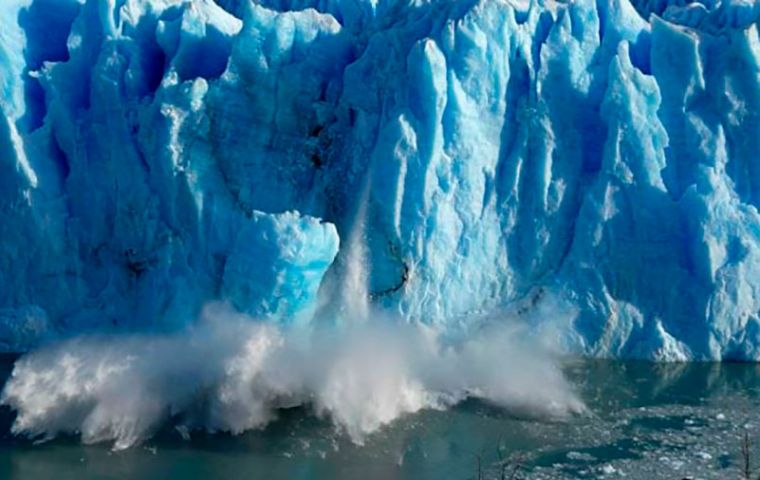MercoPress. South Atlantic News Agency
One-third of the world's glaciers will be soon gone, UNESCO warns
 UNESCO is calling for a reduction in gas emissions and for additional funding to monitor glaciers
UNESCO is calling for a reduction in gas emissions and for additional funding to monitor glaciers A UNESCO study released Thursday has shown that one-third of the glaciers worldwide are bound to disappear due to global warming.
The research was conducted on 18,600 ice formations that occupy 66,000 square kilometers, 10% of the planet's glacier surface. One-third of the glaciers declared a World Heritage will disappear before 2050, the agency insisted while calling for a rapid reduction of carbon dioxide emissions.
According to the latest Intergovernmental Panel on Climate Change (IPCC) report published in February, the melting of ice and snow is one of the top ten threats caused by global warming.
The World Heritage glaciers lose 58 billion tons of ice each year and melting ice contributes to rising sea levels worldwide, according to Unesco.
The remaining two-thirds “could be saved if we limit global warming to 1.5 degrees,” added the UN's education, science, and culture agency.
COP27 to be held Nov. 6-18 in the Egyptian city of Sharm el Sheikh will be “crucial in helping to find solutions,” Unesco director Audrey Azoulay underlined.
According to the study, all of Africa's World Heritage glaciers “will have disappeared” by 2050, including those in Tanzania's Kilimanjaro National Park. The same fate awaits the glaciers of the Pyrenees-Monte Perdido in France and Spain, as well as those of the Dolomites in Italy and those of Yellowstone and Yosemite National Parks in the United States. Glaciers in protected areas of the three parallel rivers of Yunan, China, lost more than half of their volume and are the fastest melting among the designated sites, it was also reported.
“About 50% of world heritage glaciers could disappear completely by 2100 under a scenario in which emissions remain at current levels,” UNESCO stressed while calling for a “drastic” reduction in greenhouse gas emissions and also for the creation of an “international fund for the monitoring of glaciers.”




Top Comments
Disclaimer & comment rulesCommenting for this story is now closed.
If you have a Facebook account, become a fan and comment on our Facebook Page!